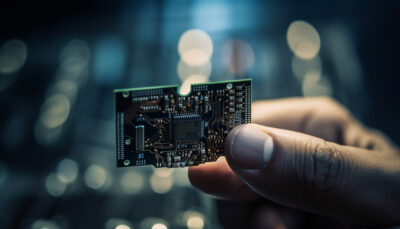
Prime Minister Narendra Modi, addressing the fourth annual Semicon India conference, announced that India is entering a new phase of its semiconductor mission—one centered on chip design and homegrown intellectual property—to secure a stronger position in the trillion-dollar global chip market.
The Prime Minister on Tuesday said that India is moving into the next phase of its semiconductor mission with a sharper focus on chip design and intellectual property, promising a revamp of the design-linked incentive (DLI) scheme to give the country a stronger foothold in the trillion-dollar global chip market.
“The government will also give a new look to the design-linked incentive scheme. Our effort is to develop Indian intellectual property in this sector,” Modi said at the fourth annual Semicon India conference. “The day is not far when the smallest chip made in India will drive the biggest change in the world,” he said.
Launched in 2021 with an outlay of ₹1,000 crore, the Design-Linked Incentive (DLI) scheme was intended to encourage startups to develop chip designs and secure patents. However, adoption has been limited, with only 23 projects approved so far. Industry experts have consistently pointed out that the current support—subsidies of up to ₹15 crore per startup and a sales-linked incentive capped at ₹30 crore—falls short of meeting the needs of deep-tech entrepreneurs, who require higher risk capital and longer-term backing.
By announcing a reset, the Prime Minister signaled that these gaps would be addressed, aligning the programme with the government’s broader vision of transforming India from a talent hub into a creator of semiconductor intellectual property. “Today, India contributes 20% of the world’s semiconductor design talent,” he said, urging small firms and startups to seize the opportunity. “Design is ready. Mask is aligned. Now is the time for precision execution and delivery at scale.”
“In the world of semiconductors, it is often said, ‘Oil is black gold, but chips are digital diamonds’. Oil shaped the previous century, but the power of the 21st century is concentrated in the small chip,” Modi said, noting that the global semiconductor market has already reached $600 billion and is on course to cross $1 trillion. “Given the pace at which India is advancing in the semiconductor sector, India will hold a significant share in this trillion-dollar market.”
Towards a Complete Semiconductor Ecosystem
Launched in December 2021 with an outlay of ₹76,000 crore, the India Semiconductor Mission allocated ₹65,000 crore for fabrication units and ₹10,000 crore for upgrading the Semiconductor Laboratory in Mohali. Prime Minister Modi emphasized that the mission’s next phase goes beyond a single fab or project. The focus now is on creating a comprehensive ecosystem that spans chip design, manufacturing, packaging, and advanced high-tech devices.
“In total, 10 semiconductor projects are now underway, involving an investment of over $18 billion — more than Rs 1.5 lakh crore,” Modi said. “This reflects the growing global trust in India. The shorter the time from file-to-factory, the sooner wafer work can begin. We are working with this very approach.”
Electronics and IT minister Ashwini Vaishnaw said five domestic projects were already under construction and moving quickly. “The pilot line of one unit (CG Power) is completed. Two more units are expected to start production in a few months,” he said. “Overall, we can say that the foundation of this foundational industry has been laid very well.”
Modi underlined that reforms to the approval process and infrastructure have reduced red tape. A national single-window system now allows both central and state clearances to be obtained online, while semiconductor parks are being set up with plug-and-play facilities, including land, power, ports, airports and access to skilled labour. “India is moving beyond backend operations and progressing towards becoming a full-stack semiconductor nation,” he said.
The Prime Minister highlighted progress at design centres in Noida and Bengaluru, noting that they are developing some of the world’s most advanced chips—capable of storing billions of transistors and powering next-generation immersive technologies. He further announced that test chips from Micron Technology and Tata Electronics are already in production, with commercial production set to begin later this year.
“Our journey may have started late, but nothing can stop it now,” Modi said. “The world trusts India, the world believes in India, and the world is ready to build the semiconductor future with India,” the Prime Minister added.
(This content is sourced from a syndicated feed. The Japan India Manufacturing Journal website assumes no responsibility or liability for its accuracy, completeness, or content.)




COMMENTS